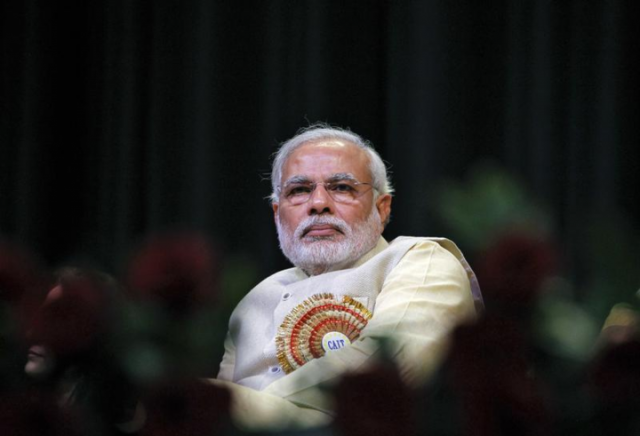The maharajah’s new clothes
Yes. You heard that right. The award for the most unfriendly neighbour on the planet goes to… India.

Indian Premier Narendra Modi. PHOTO: REUTERS
For some years now, the importance that has been accorded to India by its “allies” on the other side of the world has acted in tandem with its innate sense of hubris and self-importance, to dupe India into the belief that it can get away with being the worst neighbour in the world.
Yes. You heard that right. The award for the most unfriendly neighbour on the planet goes to… India.
Inarguably, this very unfriendliness towards sovereign countries in its immediate proximity, which may, indeed, have been accentuated under the hardline and devoutly xenophobic regime of Narendra Modi, has resulted in India literally being surrounded by countries that seem to have had enough of its acrimony. Recent days have seen deadly clashes erupt along the Line of Actual Control (LAC) that it shares with China; which have been largely one-sided with regards to India’s losses in both men, territory and credibility. Nepal’s parliament has recently and unanimously decided to adopt a new national emblem, and a political map that includes areas that are considered “Indian” by India. Against Pakistan, which India seemingly considers the perpetual thorn in its side, while it struggles to burnish its demeanour as a “global power” — hardly a week passes by without some exchange of fire and loss of life, along the Line of Control (LoC). Let’s not even begin to mention how India also has bones to pick with Bangladesh, Sri Lanka, Bhutan, the Maldives, and Myanmar.
It is a staggering “testament” to India’s intransigence in settling disputes with its neighbours that the border issue with China can be traced as far back as 1865, when the British still ruled the Subcontinent. The one with Nepal goes further back; to the Treaty of Sugauli of 1816. The Kashmir imbroglio with Pakistan is the “youngest”, dating to the time of Partition, still, some 73 years in the making. “Where there’s a will, there’s a way” is an oft-quoted adage; that holds a good deal of relevance in the case of India’s issues with its neighbours. A clear lack of will on its part to resolve such disputes is quite strikingly clear.
In contrast to this are the “strategic” ties India enjoys with countries located in different parts of the globe, altogether.
The US seems to have found a widely-overlapping convergence of interests with India, especially with regards to propping it up as a regional “counterbalance” to China. Its enormous population, often regarded as one seventh of all humanity, is viewed as a giant market for American goods, or what little goods the US actually makes or produces, nowadays. Its vast diaspora in the US counts as an important demographic in internal electoral dynamics. Its repeated self-references of being the biggest democracy in the world tends to align with the US worldview of how things must be. Its Hindutva-based, far-right wing, exclusionary policies resonate with the xenophobia, Islamophobia, and outright racism that seems to have become the dominant traits of America under Donald Trump.
India’s next biggest “friend” would be Israel. Here, too, an alignment of interests and ideologies and the idiosyncrasies of its leadership seem to underpin this relationship more than anything else. Under Netanyahu, Zionism’s policy of “settlerism”, and the “ghettoisation” and persecution of the Palestinian populace has eerie parallels to Hindutva’s desire under Modi for an ever-expanding “Akhand Bharat”, and the current treatment meted out to minorities in India. A burgeoning disrespect — I’ll refrain from using the word “hatred” — for all things and persons “Muslim” is the other common ground. As is the fact that within the larger scheme of things, Israel, in the context of the Middle East and the Mediterranean, and India, in the context of South Asia and the Indian Ocean, are expected to play similar roles. Within their respective regions where they just can’t seem to get along with any of their neighbours they are seen as Uncle Sam’s local “toughs”; propped up, and supported, and encouraged, as long as they’re serving US interests.
This support from outside the neighbourhood seems to have come to a grinding halt nowadays. The coronavirus pandemic, anti-racist movements around the world, the internal struggle within countries to keep their economies afloat, and — more than all else perhaps — a growing perception of India’s own fault lying at the centre of so many of its problems might possibly be the cause for India standing very alone, and very isolated, today. A fate which Narendra Modi, and there’s that “worst neighbour in the world” factor coming into play again, had very publicly wished for Pakistan, scant years earlier.
And that’s what is particularly strange. How even the most rudimentary, most basic levels of diplomatic succour haven’t come in India’s way in recent days despite its efforts to portray itself as having been wronged by all. Sure, there has been clucking, partially supportive noises that have come to India’s ears, but nowhere near the sort of brimstone and fury and outrage that they would like to hear from the world. In fact, erase that... the sort of outrage they expect to hear from the world.
Caught up in its own vortex of self-professed impunity and grandiloquent self-delusion, India seems to have forgotten the tailpiece of Hans Christian Anderson’s story; the very first ones to abandon the naked emperor were the ones who supposedly stitched his non-existent “new clothes”.
Published in The Express Tribune, June 23rd, 2020.
Like Opinion & Editorial on Facebook, follow @ETOpEd on Twitter to receive all updates on all our daily pieces.















COMMENTS
Comments are moderated and generally will be posted if they are on-topic and not abusive.
For more information, please see our Comments FAQ